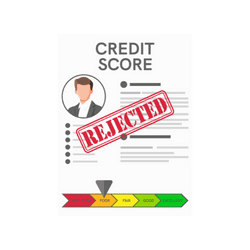Buying a car with bad credit is possible—it’s just going to cost you. You’ll probably have a higher interest rate and require a bigger down payment, and you may have a much smaller selection to choose from than someone with a better credit history.
Buying a Car With Bad Credit
If you have poor or bad credit, buying a vehicle requires some common steps that people with good credit don’t necessarily need to worry about. Consider taking these steps when buying a car with bad credit.
1. Check Your Credit
If your credit is poor, you may be stuck paying a higher interest rate until you can improve your credit scores. Your credit score is a huge factor when it comes to the interest rate and credit financing you will receive for your auto loan—or if you’ll be approved at all. You’ll want to go into this process knowing what your score is and what your options are.
Check your credit from all three major credit bureaus several months before you begin your car shopping journey so you have time to rebuild your credit if possible. Track your credit history to determine the areas where you can most improve before applying for a car loan.
2. Improve Your Score
There is no official minimum credit score you need to buy a car, but a higher score will open up more options and better rates. According to Experian, the average credit score for used car purchases at the end of 2018 was 659.
If your score is below 660, look for ways to improve your score before applying for a car loan. Your free Credit Report Card from Credit.com will help you determine the most efficient ways to improve your score: paying off debt, clearing up errors or taking care of old collection accounts could bump you over that coveted 700 threshold. Delaying the car finance process to improve your poor credit score and rebuild your credit can save you money in the long run.
3. Fix Credit Errors
If you find mistakes on your credit reports, fixing those errors could bring your score up quite a bit. If possible, give yourself at least 30 days to dispute credit report mistakes before you start car shopping and looking for an auto finance company or submit a loan application. If you think this is your best option, you can try DIY credit repair, or work with a credit repair service such as those from Lexington Law.
4. Know What You Can Pay
Whether or not you’re able to improve your credit score, you should know what you can afford to pay before you start shopping—and stay committed to your budget. Auto loan calculators are helpful tools to use when you are trying to determine how much car you can afford. These calculators can also provide you with an estimate of what you will be paying for the entire term of the auto loan, interest included.
5. Make a Bigger Down Payment
If your score is still on the low side and you don’t have more time to rebuild your credit before purchasing a car, be prepared to put a large chunk of money down. If you’re able to put down more money, you can borrow less money—which will usually mean more savings overall. How much you have to put down on a car with bad credit depends on how low your score is (and why) as well as the price of the car and the dealer you’re working with. In general, at least $1,000 or 10% of the purchase price is recommended.
If you’re unable to put any money down, your options will be severely limited. You may be able to buy a car from a private seller who is willing to take payments, but this scenario is unlikely.
6. Get a Shorter Loan
Longer loans are generally considered a higher risk: there’s more time for you to potentially default on the loan, so the interest rates tend to be higher. The monthly payments will be higher for shorter loans, however, so make sure you are able to fit this into your budget with some room to spare.
7. Work with a Bad Credit Car Dealer
If you need a car now and have a credit score that falls below the 600 range, you may need to go to bad credit car dealerships that specialize in no-credit or poor-credit buyers. These dealerships will work with your credit history to get approval, but interest rates will likely be high and terms may be unfavorable.
8. Get Pre-approved
Getting pre-approval for auto financing from a bank or credit union could better prepare you for the car shopping process. This pre-approval process analyzes your income, expenses, credit score and credit report and determines if you qualify for an auto loan from the lender and how much the lender would be willing to lend. Submitting your paperwork early and learning what obstacles you face could spare you a lot of headaches later when going through the loan approval process.
9. Get a Co-signer
If you have a poor credit score, it may be helpful to get a co-signer for your loan application. Not all lenders offer this option, so consider this carefully before moving forward Buying a Car with Bad Credit.
10. Comparison Shop
Always shop around for your loan. You never know what options are available until you look. Look for the best possible terms and make sure that you can actually afford the payments so you don’t end up negatively affecting your credit even more. It’s also a good idea to compare rates from other lenders like banks or credit unions before settling on a loan straight from the dealership.
11. Read the Fine Print
The fine print can make a big difference in the overall purchase price of the vehicle, especially if your credit means a high interest rate. Make sure there’s no prepayment penalty so you’re not fined for paying off a loan quicker than agreed, and avoid pricey add-ons that increase the sales price.
12. Refinance
Auto loan refinancing could help lower your auto loan rates and your monthly payment, which could end up saving you hundreds over the life of the loan. For loan refinancing, you typically want a strong history of making on-time payments for at least 12 months. However, keep in mind that the loan refinancing will also take your credit history and current credit scores into account as well. So, as always, continue working diligently to improve and rebuild your credit rating.
Key Takeaways
Whether or not you can get a car loan with bad credit depends on many factors. If you follow these tips, you may be able to get an auto loan and save money even with poor credit scores.

